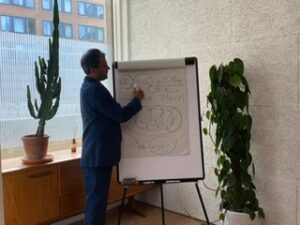Context
Are you an aspiring or experienced English teacher looking to enhance your teaching skills and credentials? The CELTA (Certificate in English Language Teaching to Adults) is your gateway to a successful teaching career. Designed for individuals passionate about teaching English as a second language, CELTA is a globally recognized qualification that equips you with practical teaching techniques, classroom management skills, and the confidence to teach English effectively anywhere in the world.
CELTA, for English teacher courses, is designed by individual centres, based on specifications produced by Cambridge English Language Assessment (CELA).
CELTA course topics
You will cover five main topics as part of your CELTA course:
- Learners and teachers, and the teaching and learning context
- Language analysis and awareness
- Language Skills: Reading, listening, speaking and writing
- Planning and resources for different contexts
- Developing teaching skills and professionalism.
How you will be assessed
You will be assessed throughout the course. There is no final examination. An external assessor, appointed by CELA, moderates each course.
There are two types of assessment: Teaching Practice and Written Assignments. To get the CELTA certificate, you must pass both assessments. These are the three passing grades:
- Pass ‘A’
- Pass ‘B’
- Pass
Teaching Practice
You will teach for a total of six hours, working with classes at two levels of ability. Assessment is based on your overall performance at the end of the six hours.
Written Assignments
You will complete four written assignments that focus on:
- Analysing and responding to learner needs
- Analysing language for teaching purposes
- Teaching language skills
- Reflecting on classroom teaching.
Delta
Delta is one of the best-known and most popular advanced TEFL/TESOL qualifications in the world. It is a flexible way for experienced English language teachers to progress further in their careers. Delta can be taken at any stage in a teacher’s career and is ideal for those wanting to build on their teaching knowledge and improve their practice.
Test modules
There are three Delta Modules, with a choice of two options for Module Three:
- Module One: Understanding Language, Methodology and Resources for Teaching
- Module Two: Developing Professional Practice
- Module Three:
- Option 1: Extending Practice and ELT Specialism
- Option 2: English Language Teaching Management
Module 1
Aim: Understand Language, Methodology and Resources for Teaching (20 credits)
This module focuses on the background to teaching and learning English in a range of contexts.
Content areas
- Theoretical perspectives on language acquisition and language teaching
- Different approaches and methodologies, including current developments
- Language systems and learners’ linguistic problems
- Language skills and learners’ problems
- Knowledge of resources, materials and reference sources for language learning
- Key concepts and terminology related to assessment
Assessment
Module One is a written examination which includes two 90-minute written papers with a 30-minute break between each paper. The examination is externally set and marked.
Preparation
You can prepare for Module One by:
- Following a course at one of the approved centres
- Reading and studying independently using English language and teaching methodology reference books.
Download a summary of description and structure for Module One (PDF, 33kb)
Module 2
Aim: Develop Professional Practice (20 credits)
This module focuses on the principles and practice of planning and teaching.
Content areas
- The language learner and the language learning context
- Preparation for teaching English to language learners
- Evaluating, selecting and using resources and materials for teaching purposes
- Managing and supporting learning
- Evaluation of lesson preparation and teaching
- Observation/evaluation of other teachers’ lessons
- Professionalism and opportunities for professional development
Assessment
Module Two requires a portfolio of coursework, including observed lessons, background written essays and an externally assessed lesson observation.
Preparation
You can prepare for Module Two by:
- Buying an English language reference book (your centre will recommend one)
- Thinking about your strengths and weaknesses as a teacher
- Asking colleagues or other members of staff to observe a lesson and give you constructive feedback
- Observing other teachers to experience new techniques, materials and resources
Download a summary of description and structure for Module Two (PDF, 24kb)
Download Assessment Specifications for Module Two (PDF, 73kb)
Module 3
Option 1:
Aim: Extending Practice and ELT Specialism (20 credits)
This module focuses on needs analysis, syllabus design, course planning and assessment in the context of a selected specialism.
Content areas
- Research into specialist areas
- Principles of syllabus design and implications for specific learning contexts
- Designing syllabus and teaching programs to meet the needs of learners in the specific context of the selected specialism
- Course design and development in the specific context of the selected specialism
- The principles and practice of testing and assessment and their application to the candidate’s specialist area
- Monitoring and evaluating the effectiveness and quality of courses and programs of study.
Option 2:
Aim: English Language Teaching Management (20 credits)
This module focuses on situation analysis and planning, and implementing change in the context of a selected management specialism.

Content areas
- Research into a chosen management specialism
- Methods of situation analysis
- Design of change proposals
- Implementation of change proposals.
- To successfully complete the English Language Teaching Management option, candidates will need to have access to management data from a relevant language teaching context.
Assessment
Module Three is an extended written assignment. For Option 1, the assignment is focused on a specialist area of teaching and learning chosen by the candidate (E.G: English for academic purposes, teaching exam classes, young learners, one-to-one teaching). For Option 2, candidates complete an assignment on their chosen ELT management specialism. The extended assignment is externally marked.
Preparation
You can prepare for Module Three by:
- Following a course at one of the approved centres
- Reading and studying independently using reference books focusing on your chosen specialism, as well as books on assessment, syllabus and course design
- Observing other teachers to experience new teaching contexts.
Course fee: £950.00



